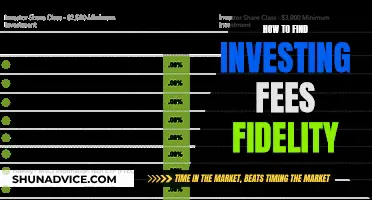
Artificial intelligence (AI) is one of the biggest trends of the 2020s. As the technology develops, investors are keen to get in on the ground floor of mutual funds that invest in AI. AI-based mutual funds are a popular type of investment vehicle that pools multiple investors' money to purchase stocks, bonds, and other securities in artificial intelligence. They can help investors diversify their portfolios, decrease risk, and generate higher returns than individual security investments.
AI funds are unique in that they specifically focus on opportunities in artificial intelligence and are managed by professional fund managers with expertise in the field. They use research and market analysis to decide which AI-related stocks and securities to buy and sell. Some funds are AI-managed mutual funds, meaning the fund manager uses artificial intelligence to aid decision-making.
There are several types of AI funds, including robotics funds, which invest in companies that design and build robots for industrial, medical, or military applications, and machine learning/deep learning funds, which focus on computer vision technologies like facial recognition software, virtual personal assistants, and chatbots.
When choosing an AI mutual fund, it is important to consider factors such as its track record of returns, fees, and the level of risk involved. While AI funds offer the potential for high returns, they also carry risks due to the new and rapidly changing nature of the AI industry.
What You'll Learn

Robotics funds
One example of a robotics fund is the ROBO Global Robotics and Automation ETF, which seeks to replicate the price and yield performance of the ROBO-STOX Global Robotics and Automation Index. The fund normally invests at least 80% of its assets in securities within the index, which includes companies primarily engaged in robotics and automation, with a minimum market capitalisation of $200 million. Another option is the 3D Printing, Robotics and Technology Fund, which invests at least 80% of its assets in securities issued by domestic and foreign companies engaged in 3D printing, robotics, and automation.
Other notable robotics funds include:
- Global X Robotics and Artificial Intelligence Thematic ETF (BOTZ)
- ROBO Global Artificial Intelligence ETF (THNQ)
- Global X Robotics & Artificial Intelligence ETF
- IShares Robotics and Artificial Intelligence Multisector ETF (IRBO)
Sovereign Investment Funds: How Nations Invest and Why
You may want to see also

Machine learning/deep learning funds
- Global X Robotics and Artificial Intelligence ETF (BOTZ): This fund offers exposure to companies working in industrial robotics, automation, non-industrial robots, and autonomous vehicles. Its top five holdings include Nvidia, ABB, Intuitive Surgical, Keyence, and SMC Corp. It has an expense ratio of 0.68%.
- ROBO Global Robotics and Automation Index ETF (ROBO): This fund focuses on companies driving transformative innovations in robotics, automation, and AI. Its top five holdings include Intuitive Surgical, Novanta, Zebra Technologies, Fanuc, and ServiceNow. It has an expense ratio of 0.95%.
- IShares Robotics and Artificial Intelligence ETF (ARTY): This fund aims to track the results of an index of developed and emerging market companies that could benefit from long-term opportunities in robotics and AI. Its top five holdings include Nvidia, Lumen Technologies, SiriusXM Holdings, Genius Sports, and Hello Group. It has an expense ratio of 0.47%.
- First Trust Nasdaq Artificial Intelligence and Robotics ETF (ROBT): This fund tracks the Nasdaq CTA Artificial Intelligence and Robotics Index, which includes companies engaged in AI and robotics in technology, industrials, and other sectors. Its top five holdings include ServiceNow, SentinelOne, Appian, Palantir, and Inphi. It has an expense ratio of 0.65%.
- Invesco AI and Next Gen Software ETF (IGPT): This fund tracks the STOXX World AC NexGen Software Development Index, which includes companies generating revenue from software and AI, such as data storage, robotics, autonomous vehicles, semiconductors, and web platforms. Its top holdings include Meta Platforms, Alphabet, and Nvidia. It has an expense ratio of 0.6%.
Bond Fund Investment: Where Does Your Money Go?
You may want to see also

AI-powered active trading ETFs
- QRAFT AI-Enhanced US Large Cap ETF (QRFT): This ETF uses AI technology to inform its trading decisions and is not focused on AI or technology stocks. It has a 0.59% expense ratio.
- QRAFT AI Enhanced U.S. Large Cap Momentum ETF (AMOM): This ETF is designed to track the performance of large-cap U.S. companies with high momentum and uses AI to enhance its selection process. It has a 0.65% expense ratio.
- Franklin Exponential Data ETF (XDAT): This ETF focuses on companies that are leveraging data and exponential technologies, including AI, to drive innovation and growth. It has a 0.59% expense ratio.
- WisdomTree U.S. AI Enhanced Value Fund (WTAI): This ETF uses an AI-enhanced strategy to select large-cap U.S. stocks trading at a discount. It has a 0.45% expense ratio.
- Amplify AI Powered Equity ETF (IEEE): This ETF uses AI technology to evaluate companies based on their AI-readiness and potential for growth. It has a 0.55% expense ratio.
When investing in AI-powered active trading ETFs, it is important to consider your investment goals and conduct thorough research. Diversification is also crucial as the AI market is still in its early stages of development. Additionally, these ETFs come with risks and fees, so careful consideration is necessary before investing.
Oil Fund Investment: A Smart Financial Move?
You may want to see also

AI-enhanced ETFs
- Technology ETFs: these are baskets of tech stocks, which may include companies that are key players in AI, such as Microsoft and NVIDIA.
- Thematic ETFs: these funds are specifically focused on the theme of AI. Their holdings tend to look similar to those of general tech ETFs.
- QRAFT AI-Enhanced U.S. Large Cap Momentum ETF (AMOM)
- QRAFT AI-Enhanced U.S. Large Cap ETF (QRFT)
- QRAFT AI-Enhanced U.S. Next Value ETF
- QRAFT AI-Enhanced U.S. High Dividend ETF
- LG-QRAFT AI-Powered U.S. Large Cap Core ETF
A Guide to Index Fund Investing in the US
You may want to see also

AI-focused exchange-traded funds
Global X Robotics & Artificial Intelligence ETF (BOTZ)
BOTZ is a fund that invests in companies that benefit from AI and automation. It has a diverse portfolio of companies, including firms working on the industry's hardware and software. Some of its top holdings include Nvidia, Intuitive Surgical, and Keyence Corp. The fund has a relatively high expense ratio of 0.68% compared to other AI ETFs, but it has a solid track record of returns, making it a great option for those bullish on the long-term growth potential of AI.
ROBO Global Robotics and Automation Index ETF (ROBO)
ROBO invests in companies driving transformative innovations in robotics, automation, and AI. The fund's portfolio is diversified across multiple countries and sectors, including healthcare, industrial automation, and AI. Some of its top holdings include Yaskawa Electric Corp, ABB Ltd, and Teradyne Inc. ROBO also has a high expense ratio of 0.95%, but its diverse portfolio helps to mitigate risk.
IShares Robotics and Artificial Intelligence ETF (ARTY)
ARTY aims to track the results of an index of developed and emerging market companies that could benefit from long-term opportunities in robotics companies and AI. The ETF has less than $1 billion in assets under management and is well-diversified, with 103 stock holdings. Some of its top holdings include Nvidia, Lumen Technologies, and SiriusXM Holdings. The fund has a competitive expense ratio of 0.47% and a dividend yield of 0.8%.
First Trust Nasdaq Artificial Intelligence & Robotics ETF (ROBT)
ROBT tracks the Nasdaq CTA Artificial and Robotics index, which is made up of companies engaged in AI and robotics in technology, industrials, and other sectors. The fund has a well-diversified portfolio, with 107 stock holdings. Some of its top holdings include ServiceNow, SentinelOne, and Appian. ROBT offers an expense ratio of 0.65% and a dividend yield of 0.27%.
Invesco AI and Next Gen Software ETF (IGPT)
IGPT is a thematic AI ETF that tracks the STOXX World AC NexGen Software Development Index. The index targets 100 companies from across the globe that generate revenue from various forms of software and AI. Some of its top holdings include Meta Platforms, Alphabet, and Nvidia. The fund has a reasonable expense ratio of 0.6%.
Xtrackers Artificial Intelligence and Big Data ETF (XAIX)
XAIX is a forward-looking fund that screens for approved patents in fields related to AI, such as deep learning, image and speech recognition, and natural language processing. The European version of XAIX holds over $3.5 billion in assets and is available to US investors at a 0.35% expense ratio.
Roundhill Generative AI & Technology ETF (CHAT)
CHAT offers exposure to generative AI, the most exciting technological advancement in years, with the ability to transform how we live and work. The ETF selects stocks using a proprietary methodology that evaluates companies' relevance to generative AI, factoring in revenue, profit, and R&D investment. CHAT charges a 0.75% expense ratio.
REX AI Equity Premium Income ETF (AIPI)
AIPI is a unique AI ETF that uses a covered call strategy to generate income by selling call options on each of its individual holdings. This provides a rare income source in a sector not typically associated with dividends. AIPI currently pays a 34.8% distribution rate.
When choosing an AI ETF, it is important to consider the fund's holdings, expense ratio, dividend yield, and past performance. Additionally, diversification is key as the AI market is still in the early stages of development.
Money Market Funds: Where Your Money Is Invested
You may want to see also
Frequently asked questions
Some mutual funds that invest in artificial intelligence include the Global X Robotics & Artificial Intelligence ETF, the ROBO Global Robotics and Automation Index ETF, the iShares Robotics and Artificial Intelligence ETF, and the First Trust Nasdaq Artificial Intelligence & Robotics ETF.
Investing in mutual funds that focus on artificial intelligence can provide exposure to a broad range of AI companies, allowing investors to capture the growth of the sector without needing to pick individual stocks. It also offers diversification, which can help reduce the risk of an individual stock underperforming.
When choosing a mutual fund for investing in artificial intelligence, it is important to consider the fund's expense ratio, dividend yield, and past performance. It is also crucial to assess the types of companies the fund invests in and ensure they align with your investment goals and risk tolerance.
Investing in mutual funds that focus on artificial intelligence carries similar risks to investing in any other sector. There is the risk of losing your principal investment due to market shifts or the performance of individual companies. Additionally, the AI industry is subject to regulatory scrutiny and rapid technological changes, which can impact the operations and success of AI companies.
To get started, you will need to open an investment account, such as a brokerage account or an individual retirement account (IRA). You can then research and compare different mutual funds that invest in artificial intelligence based on their holdings, performance, fees, and other factors to determine which one aligns with your investment goals and risk tolerance.







